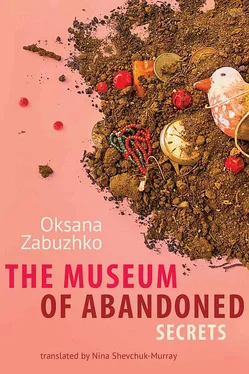And, she tells Adrian, she would like to film the restoration workshop they’d visited. It resembles his dream shop of antiquities a little, the Utopia he told her about: with its unhurried, taciturn men in leather aprons, filled with a special inner dignity, with graphite-black fingers and an assured, almost genetic confidence in their way with objects—an atmosphere of unworldliness, so uncommon in the modern world, and, to an accidental visitor, all but church-like, and inseparable from honest work; the atmosphere she remembers from Vlada’s workshop, and up until recently one could glimpse it in the last relics of ancient artisanry: cobblers’ kiosks, TV repair shops, countless basement rooms smelling of wax and turpentine, where men fixed umbrellas, locks, eyeglass frames, and just about everything that could be fixed.
This disappeared in our lifetime; we watched it vanish, these pitiful remnants of the once-powerful Kyivan commonwealth, wiped out by the Great Ruin of the twentieth century: smiths, coopers, crockers, tanners, and lorimers, the once-glorious guilds that for centuries built up this city, founded churches and schools despite every alien tsar and magistrate—men who sat just like this in their tiny workshops two, and three, and five hundred years ago, and took with gravity into their hands the things people brought them, pronouncing their verdicts once and for all, as only men who know the true and good price for their work can. Not the price people pay at the market, but the one that is measured by the sum of expended life: the number of dioptres added to their sight over the years, the wheezing in their turpentine-laced lungs, their skin burned from constant heat, the high-contrast map of their wrinkles. The absolute concentration and surgical precision of movement with which a restorer, looking through a magnifying glass, dabbed away layers of age-old grit from a spot on an icon evoked in Daryna a downright sacramental reverence—a feeling remarkably similar to the one Gela’s story aroused in her. But this is also something she cannot convey to Adrian—she doesn’t know how to explain to him what these images could possibly have to do with a film about resistance. Except maybe as a metaphor for her own archival work—for her method (if that’s what it was): this persistent, ant-like, unwavering, peeling off of layer after layer, inch by inch….
This is also resistance, Adrian thinks. Daryna’s got it right. To work the way these restoration guys work—in utter self-dedication, for miniscule pay, purely out of devotion to what you do—that is resistance in its purest form, the essence of resistance, like that voice stripped of words down to a bare melodic lament. She’s got it right. An intelligent woman must, after all, have a leg up on an intelligent man because she is endowed with this additional perceptiveness, one we lack—one that stems from her sisterhood with every living thing, regardless of place and time….
A passing trolleybus blows a used ticket at his feet, and he bends down, moved by a sudden urge to pick it up, see, as he used to do when he was little, if the number is lucky, but he misses it: the ticket flies off, mixes with other litter at the edge of the sidewalk. There’s another thing I will never find out , he thinks, and shrugs, surprised at himself: I must be getting superstitious, too.
Aloud, he tells her that what he loves most about the city at dusk is its quiet courtyards—and gold rectangles of light from the windows cast onto the snow.
“Onto the snow? Why snow?” This surprises her a bit.
“Well, it doesn’t have to be snow,” he concedes, without real conviction; it could be on the asphalt. For some reason, he doesn’t want to talk about this anymore, and she understands it—their thoughts, in the warm, exhaust-laced air of the spring evening, flowing in and out of each other, like intertwined fingers. The light turns to green and they step into the crosswalk like a pair of well-behaved children—holding hands and not even noticing they are.
* * *
VMOD-Film
Written by Daryna Goshchynska
EXT. CITY – NIGHT.
In the courtyard behind a city high-rise, on the playground, a girl sits—she’s squatting like a young child, but there’s already a frozen, unchildlike grace in her pose. The playground is empty: it’s getting dark; the little ones have all been taken home; the girl is already too old for the sandbox, but still too young to be part of the next shift, which will soon arrive with their glowing dots of cigarette tips in the dark, the strumming of their guitars, and the bursts of silly laughter or a girl’s squeal ripped from the hubbub, or the tink of rolling glass—the chaotic, Brownian splashes of puppy-like youthful sensuousness that will make a late passerby shy and hasten to reach his door.
Later still, in the short hours of night, when everything grows quiet, the couples will arrive, and some retiree, kept up by his insomnia and arthritis, will come out on his balcony for a smoke without turning on the lights, and will catch below a moon-glazed glimpse of flesh freed of clothes, a white stain—a breast, a hip—and will get angry because now he won’t be able to fall asleep until morning for sure. But all this will be later sometime—it’s all yet ahead for the girl who squats very still at the playground.
It is growing dark, the apartments’ windows light up one by one, and the girl can barely see what she’s got in front of her: in a hole dug into the ground (it rained the day before, the earth is moist and sticky, and easy to dig with a toy plastic scoop someone left behind in the sandbox); in a white frame made of apple-tree blossoms barely visible in the dark, a piece of silver foil, spread flat, catches what little light is left. What she is to do next, the girl doesn’t know. And she doesn’t have anyone she could ask, either. But she remembers her mother doing it, like this. She remembers, from when she was very little, that this is how her mother used to begin. The paintings came later.
Somewhere above, a window clatters open—the sound sends a pack of crows tumbling out of a nearby chestnut tree where they had already settled for the night.
“Ka-tya! Kat-ru-sya!” a woman’s voice calls, echoing over the yard.
The girl startles, shielding the little hole she’s dug up. Then she looks back at the building (in the lemony-green patch of open sky between roofs, an inaudible shadow glides by: a bat).
“Coming, Gran!”
Glass! This shard, right here. To cover the hole. And then you bury it, and stamp the dirt flat, smooth it over with the scoop so that no trace remains: no one must see what she was making here; God forbid, someone should find out…. Not now. Not ever.
The girl stands up and dusts the dirt off her knees.
This book was conceived in the fall of 1999 and begun in the spring of 2002; over the next seven years, the book and I grew and developed together guided by the will of the truth that lay hidden in this story and that I, exactly like Daryna and Adrian in the novel, had to “dig up.” This is why the traditional legal formula of the publishing world whereby “all characters and events in this book are fictitious and any resemblance to real persons or events are purely coincidental” does not fit: Only the characters in this book are purely fictitious. Everything that happens to them has actually happened to various people at different points in time. And could still happen. This, actually, is what we call reality.
Reconstructing the wartime and postwar events—the ones that are reflected in Adrian’s dreams—was the most difficult and crucial task. Ukrainian, as well as European, literature is yet to develop a more or less satisfactory, adequate, and coherent narrative from that period; one is hard-pressed to find another time in the history of the twentieth century that has been buried under such veritable Himalayas of mental rubbish, packed over the last sixty years almost into concrete—the layers upon layers of lies, half-lies, innuendo, falsifications, and so on. Historical excavations of this period have begun only in the first decade of the new millennium, and in the course of working on The Museum of Abandoned Secrets , I was often delighted to receive another new message from fellow “expeditionists” spread all over Europe, from the British Islands to Ukraine, groups that, coming from different angles (different traditions, fields, and genres), have set to clearing up this logjam, Europe’s largest and most difficult—the so-called “truth of the Eastern Front.”
Читать дальше












